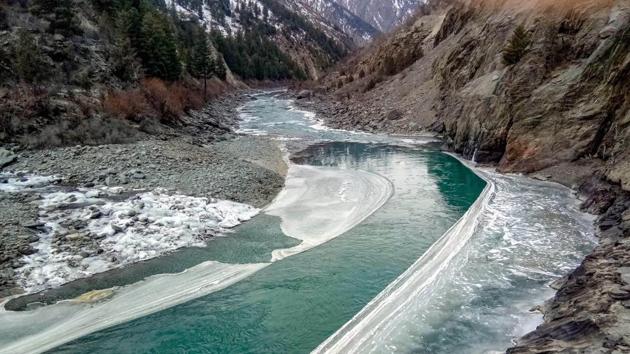Pakistani delegation inspects Pakal Dul project in J&K’s Kishtwar
Under the Indus Water Treaty, both India and Pakistan have been given the mandate to inspect dam sites and works on either sides of the Indus basin. Since the treaty was signed, there have been 118 such visits of the Pakistani delegations from time to time.
A three-member Pakistani delegation along with five Indian officials on Tuesday visited the Kishtwar district of Jammu and Kashmir to inspect 1,000 mega watt Pakal Dul hydroelectric power project and the 48 mega watt Lower Kalnai project over the Chenab river.

Kishtwar deputy commissioner Angrez Singh Rana said, “three-member Pakistani delegation and five officials of the government of India on Tuesday visited Pakal Dul hydroelectric project. They inspected the dam site. The Pakistani delegation will return on Wednesday.”
The Pakistani delegation was headed by its Commissioner for Indus Waters Syed Mehr Ali Shah.
India and Pakistan signed Indus Waters Treaty in 1960 after Pakistan aired apprehensions that since the rivers of the Indus basin were in India, it could potentially create droughts and famines in Pakistan during the times of war.
According to the treaty, India has control over three eastern rivers — Beas, Ravi and Sutlej — all flowing from Punjab. Pakistan, as per the treaty, has its share from the western rivers of the Indus, Chenab and Jhelum that flow from J&K into Pakistan.
In November 2016 Prime Minister Narendra Modi said in Bhatinda that the waters of Sutlej, Beas and Ravi rivers that rightfully belong to India will be stopped from going waste in Pakistan and he will ensure that farmers here utilise it.
The PM had also said that blood and water cannot flow together post Uri terror attack that left 19 Indian soldiers dead.
Under the IWT, both the commissions in India and Pakistan have been given the mandate to inspect dam sites and works on either sides of the Indus basin in a block of five years which ends in March 2020. Since the treaty was signed, there have been 118 such visits of the Pakistani delegations from time to time.
Earlier, the inspection of the projects by Pakistani experts was scheduled in October last year but it was delayed because of urban local bodies and panchayat elections in the state.
Pakistan had also raised objections to the Baglihar power project over Chenab in 2008 and had approached World Bank. Thereafter, India had proposed meetings and inspections under the Indus Water Commission to allay the fears of Pakistan of a reduced water discharge in Chenab.






